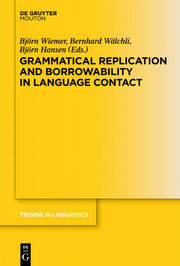Detailansicht
Grammatical Replication and Borrowability in Language Contact
Trends in Linguistics, Studies and Monographs/TiLSM 242, Trends in Linguistics. Studies and Monographs [TiLSM] 242
ISBN/EAN: 9783110270099
Umbreit-Nr.: 3842278
Sprache:
Englisch
Umfang: XIV, 670 S., 15 s/w Illustr., 39 s/w Tab., 15 Kart
Format in cm: 4.5 x 23.7 x 16.4
Einband:
gebundenes Buch
Erschienen am 14.06.2012
Auflage: 1/2012
- Zusatztext
- The volume presents new insights into two basic theoretical issues hotly debated in recent work on grammaticalization and language contact: grammatical replication and grammatical borrowability. The key issues are: How can grammatical replication be distinguished from other, superficially similar processes of contact-induced linguistic change, and under what conditions does it take place? Are there grammatical morphemes or constructions that are more easily borrowed than others, and how can language contact account for areal biases in the borrowing (vs. calquing) of grammatical formatives? The book is a major contribution to the ongoing theoretical discussion concerning the relationship between grammaticalization and language contact on a broad empirical basis.
- Kurztext
- The series publishes state-of-the-art work on core areas of linguistics across theoretical frameworks as well as studies that provide new insights by building bridges to neighbouring fields such as neuroscience and cognitive science. The series considers itself a forum for cutting-edge research based on solid empirical data on language in its various manifestations, including sign languages. It regards linguistic variation in its synchronic and diachronic dimensions as well as in its social contexts as important sources of insight for a better understanding of the design of linguistic systems and the ecology and evolution of language.
- Autorenportrait
- Björn Wiemer, Johannes-Gutenberg-Universität, Mainz, Germany; Bernhard Wälchli, Stockholm University, Sweden; and Björn Hansen, University of Regensburg, Germany.
